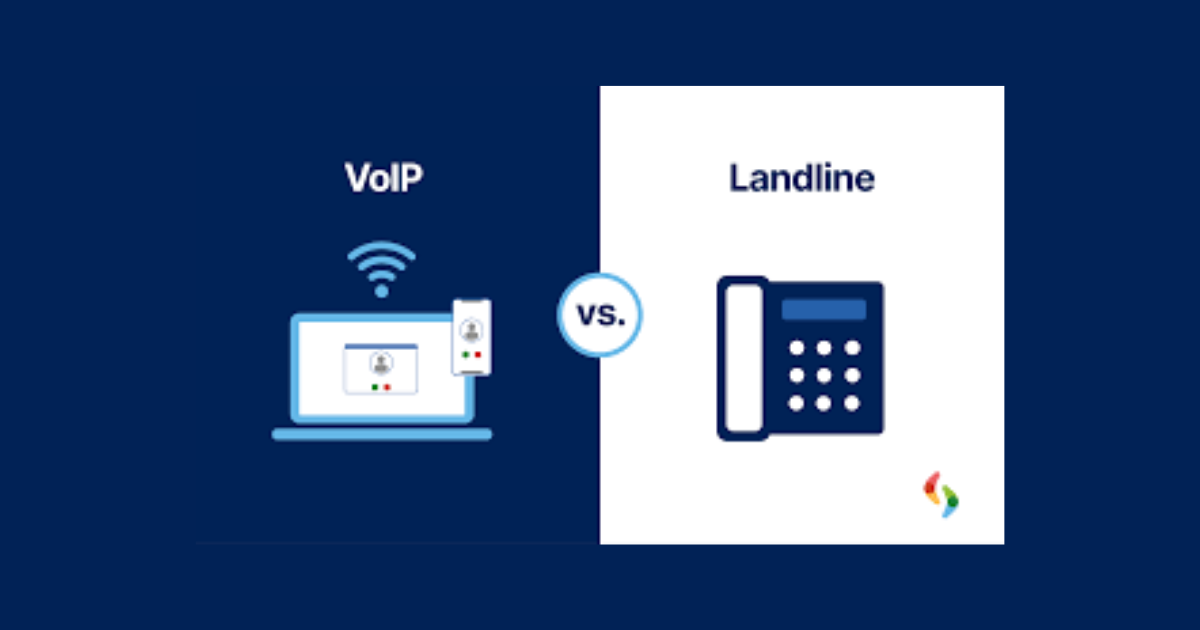Introduction
In today’s fast-paced and ever-evolving business world, communication is at the heart of every successful operation. Choosing the right communication infrastructure can be a pivotal decision for any business, as it directly impacts efficiency, cost, and customer satisfaction. Two primary options for business communication are Voice over Internet Protocol (VoIP) and traditional landline phone systems. In this article, we will explore the differences, advantages, and disadvantages of VoIP and landline phone systems to help you determine which is the best fit for your business.
VoIP (Voice over Internet Protocol)

VoIP, which stands for Voice over Internet Protocol, is a technology that allows voice and multimedia communication to be transmitted over the internet. It has gained immense popularity in recent years due to its flexibility, cost-effectiveness, and an array of features it offers.
Advantages of VoIP
- Cost Savings: One of the most significant advantages of VoIP is its cost-effectiveness. VoIP calls are typically much cheaper than traditional landline calls, especially for long-distance and international communication. This can lead to substantial savings for businesses, especially those with a significant amount of long-distance communication.
- Flexibility: VoIP provides unmatched flexibility. With VoIP, you can make and receive calls from anywhere with an internet connection, making it an ideal solution for remote and mobile workers. This flexibility enables businesses to operate from multiple locations seamlessly.
- Scalability: VoIP systems are easily scalable. Whether you are a small startup or a large corporation, you can add or remove lines and features as your business grows. This adaptability ensures that your communication system grows with your business.
- Rich Features: VoIP systems come with a range of features that can enhance your business communication, including voicemail, call forwarding, video conferencing, call recording, and more. These features can improve collaboration and productivity.
- Integration: VoIP systems can integrate with other business applications, such as customer relationship management (CRM) software, which can streamline your communication and data management.
Disadvantages of VoIP

- Dependence on Internet: VoIP relies on a stable internet connection. If your internet service goes down, your phone system will be affected. While this issue is becoming less common with the increasing availability of high-speed internet, it’s still a consideration.
- Quality and Reliability: VoIP call quality can vary depending on the quality of your internet connection. In some cases, there may be latency or dropped calls, which can be frustrating for both employees and customers.
- Security Concerns: VoIP systems can be vulnerable to security threats like hacking and eavesdropping. It’s essential to implement security measures to protect your VoIP infrastructure.
- Power Outages: During power outages, traditional landlines often continue to work because they are powered by the phone line itself. VoIP systems may require backup power sources to remain operational during power failures.
Landline Phone Systems
Landline phone systems, also known as Plain Old Telephone Service (POTS), have been a staple of communication for many decades. They use traditional copper wires to transmit voice signals.
Advantages of Landline Phone Systems
- Reliability: Landline phone systems are known for their reliability. They are less susceptible to interruptions from power outages or internet service disruptions. This reliability is crucial for businesses that cannot afford downtime.
- Call Quality: Landlines generally offer high call quality with clear and consistent sound. This is essential for businesses that rely on crystal-clear communication.
- Security: Landline systems are less vulnerable to hacking and cybersecurity threats, making them a more secure option for sensitive business conversations.
- No Internet Dependence: Landlines do not rely on the internet, so you can use them even in areas with limited or no internet connectivity.
Disadvantages of Landline Phone Systems
- Cost: Landline phone services are often more expensive than VoIP services, particularly for long-distance and international calls. They may also require additional charges for features like voicemail and call waiting.
- Lack of Features: Traditional landlines offer fewer features compared to VoIP systems. You won’t have access to features like video conferencing and integration with other business tools.
- Limited Mobility: Landlines are location-based and lack the mobility provided by VoIP systems. This limitation can be a significant drawback for businesses with remote or traveling employees.
- Scalability: Expanding or reducing the number of phone lines with landline systems can be cumbersome and may require a physical technician to install or remove lines.
Making the Right Choice for Your Business
The decision between VoIP and landline phone systems largely depends on your business’s specific needs and priorities. Here are some factors to consider when making the choice:
1. Budget
If your business is budget-conscious and looking to reduce communication costs, VoIP may be the better choice. VoIP offers cost savings, especially for long-distance and international calls, and often includes a range of features at no extra cost. Landline systems, on the other hand, can be more expensive, particularly for businesses with extensive calling needs.
2. Reliability
If your business operates in an area with a history of frequent power outages or unreliable internet connectivity, a landline system might be the safer choice. Landlines are known for their reliability in such conditions, ensuring that you can maintain communication even when other services fail.
3. Call Quality
If your business relies on crystal-clear call quality for effective communication, a landline system is a solid choice. Landlines consistently offer high call quality with minimal disruptions, making them ideal for industries where every word matters.
4. Mobility
If your business requires mobility, VoIP is the superior option. VoIP systems allow employees to make and receive calls from anywhere with an internet connection. This flexibility is particularly valuable for businesses with remote workers or those that require employees to travel frequently.
5. Scalability
Consider your business’s growth potential. VoIP systems are highly scalable and can easily adapt to your changing needs. Landline systems, on the other hand, can be less flexible and may require physical installations to add or remove lines.
6. Features
Evaluate the features your business requires. VoIP systems offer a wide range of features, including video conferencing, call recording, and integration with other business tools. If these features are essential for your operations, VoIP may be the better choice.
7. Security
Consider the level of security your business needs for its communications. If your business handles sensitive information and requires a higher level of security, a landline system may be a safer choice due to its lower vulnerability to hacking and cyber threats.
8. Integration
Think about how your phone system will integrate with other tools and systems your business uses. VoIP systems often have more robust integration capabilities, which can streamline your operations and improve efficiency.
9. Environmental Impact
For businesses looking to reduce their environmental footprint, VoIP is generally the more eco-friendly option. It requires less physical infrastructure and often has lower power consumption compared to traditional landline systems.
Case Studies: Real-World Examples
To illustrate the choice between VoIP and landline systems, let’s look at two hypothetical businesses and how each would benefit from one of these options.
Case 1: A Small Tech Startup
Business Profile: A small tech startup with ten employees working remotely from various locations. They require a cost-effective solution with modern features for virtual meetings and collaboration.
Recommended Solution: VoIP
In this scenario, VoIP is the ideal choice. The startup can enjoy cost savings on calls and access features like video conferencing and virtual meeting tools. The flexibility of VoIP allows remote employees to communicate seamlessly, and the system can easily scale as the business grows.
Case 2: A Medical Practice
Business Profile: A small medical practice with a central office and multiple examination rooms. The practice values reliable communication for patient appointments, emergency calls, and patient data security.
Recommended Solution: Landline
For a medical practice, reliability is of utmost importance. Landlines provide consistent, high-quality communication, and they are less susceptible to disruptions during emergencies. The enhanced security of landlines is crucial for safeguarding sensitive patient information.
Conclusion
In the age-old debate of VoIP vs. landline, there is no one-size-fits-all answer. The choice between the two depends on your business’s unique needs and priorities. VoIP offers cost savings, flexibility, scalability, and a wealth of features, making it suitable for budget-conscious and tech-savvy businesses with a focus on mobility and collaboration. On the other hand, landline phone systems provide unmatched reliability, call quality, and security, making them the preferred choice for businesses in areas with unreliable internet connectivity, those that handle sensitive information, and industries where call quality is critical.
Ultimately, your decision should be guided by a thorough assessment of your business’s requirements and a clear understanding of the advantages and disadvantages of both VoIP and landline phone systems. By making an informed choice, you can ensure that your business communication system aligns with your goals and supports your growth and success in the long run.



